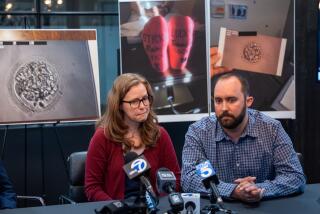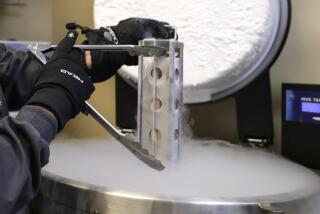Editorial: Jean Purdy and the history of not giving brilliant women their due
Jean Purdy, a nurse and embryologist, was one of three people who developed in vitro fertilization 50 years ago. But until recently, her contribution to this scientific breakthrough was largely unknown and credit was given only to the two male scientists with whom she worked.
Several decades later, Purdy is finally getting the recognition she deserves, though only because of the efforts of one of the male doctors to name her as a coequal partner. It’s great that the historical record is being corrected, but it’s a little too late to hold any meaning for Purdy. She died in 1985, just a few years after the British hospital where the first test tube baby was born deliberately left her name off a commemorative plaque and consigned her to a scientific footnote.
Purdy’s story serves as a sobering reminder that the accomplishments of many women in science, medicine, art, technology and just about every field have been overlooked, overshadowed or, in some cases, outright stolen. How many? Who can ever know, though some people are tying to figure it out through forensic research into scientific papers.
Enter the Fray: First takes on the news of the minute »
Here are a few we do know about: Rosalind Franklin, the molecular biologist who helped science understand the structure of DNA by imaging a DNA molecule, and whose work was used without credit by two scientists who went on to win the Nobel Prize; Margaret Keane, the “Big Eyes” artist whose husband took credit for her paintings until they divorced; and Hedy Lamarr, who was famous for her film parts rather than for her invention of telecommunications technology that paved the way for the development of Bluetooth and WiFi technologies.
It would be nice to think that the professional slight to Purdy wouldn’t happen in today’s enlightened culture. But it could. In fact, it still does. Studies show that the work of women continues to be regularly undervalued in scientific research, if not outright snubbed; that in professional jobs they are less likely to be promoted and more likely to be paid less; that in school they are steered toward nonscientific careers, and if they do end up in male-dominated fields like engineering and tech they are harassed or otherwise made to feel unwelcome.
And when women are celebrated for their work ahead of men? Like the scientist who helped take the first picture of a black hole, they may suffer a fate that even Purdy’s intellect couldn’t imagine: online harassment by misogynist trolls.
Follow the Opinion section on Twitter @latimesopinion and Facebook
More to Read
A cure for the common opinion
Get thought-provoking perspectives with our weekly newsletter.
You may occasionally receive promotional content from the Los Angeles Times.






